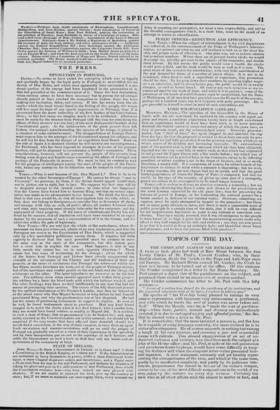REVOLUTION IN PORTUGAL.
THE PRESS.
GLOBE.—So seems to have ended the enterprise which was so happily and spiritedly begun by the loyal party in P:srtligal, to re-establish the au- thority of Don Pedro, and which must apparently have succeeded if a mo- derate portion of the energy had been employed in the prosecution of it, that had prevailed at the commencement of it. Since the first declaration, when nothing seems to have been necessaey but to pursue the advantages already gaine"ti to have crushed the usurpation in Lisbon, there has been nothing but hesitation, delay, and retreat. If this has arisen froin the ob-
stacles which the loyal troops found in the feeling of the people, this leaves still less room for hope of any speedy improvement in Portugal, that; if it proceeded from the mere imbecility of the first leaders of the Constitution- Mists ; to this last cause, we imagine, much is to be attributed. Allowance must be made for the absence from Portugal (till the time for remedying the effects of their absence was too late) of the most distinguished leaders of the Constitutional party. As the Ambassadors of the great powers have left Lisbon, the usurper, notwithstanding the success of his troops, is placed in a.situation of some embarrassment. The disapprobation of Foreign Powers niust expose him to the attempts of the discontented among his subjects, and he_will not be free from the danger of an expedition from Brazil. Even on the side of Spain it is doubted whether he will receive any encouragement ; for Ferdinand, who has been exposed to attempts in favour of his younger brother, will not be disposed to countenance a brother's usurpation. These considerations, however, will not prevent the people of this country from feeling some disgust arid hopelessness concerning the affairs of Portugal and perhaps of the Peninsula in general. We must, in fact, he content to wait for the progress of intelligence ammo- the mass of the people of the Penin- sula, before any enterprise for its liberation can be looked to with sanguine hopes. 'fnees.—What is now become of. this Don Miguel I.? How is be to he treated by the other Sovereigns of Europe ? He cannot be always " sent to Coventry," we presume, by them, if his throne should appear established, not in justice, nor in right, but in fact. We suppose his first step will be to despatch envoys to the several courts, to state what has happened that the Cortes have forced him to become King, and that no serious oppo
sition was tnade to his advancement to the throne. We think the best me- thod in that case would be, to sink all investigation into his title, which, in faets does not belong to foreigners—to consider him as Sovereign de facto, and arrange with him, as such, all pithiie affairs, all matters between state and state, only requiring most strongly indemnity for the emigrants. and the enjoyment of their property. If the cause of constitutional liberty has suf- fered by his success, that of absolutism will have been impaired in an equal degree by the accession of such a representative of it to the throne, and his admission within the pale of legitimacy. NEW TIMES.—We are told that the whole of the melo-drame, whose de- nouement we have just witnessed, admits of an easy explanation, and that the Portugese are averse to the Constitution of Don Pedro, which is supported only by a few speculative politicians among them. It requires but little sagacity to discover that the most powerful must be content to move the same way as the mass of the community, but this truism goes but a short way to explain the case. How happens it that in one little month the stream has set in such opposite directions ? There seems but two ways of accounting for the change ; either the whole of the letters from Portugal and Lisbon have grossly exaggerated the strength of the advocates of the Charter and the weakness of their op- ponents, or the series of revolutions that Portugal has witnessed within tile last fifteen months have been the work, not of the people of Portugal at large, but of the merchants and smaller gentry on the one hand, and the clergy and aristocrats on time tither. The latter hypothesis we conceive to be the true one. The soldiery, even when success appeared most within their grasp— the soldiery have been the hired tools with which the factions worked, and, like other hirelings, they have worked indifferently to any nem that had the means of perchasing their services. The return of the fifty thousand pounds by the spirited interference of Sir Frederick Lambe, may thus be looked on as the grand Cause why Don Miguel hesitated so long before he hail himself proclaimed King. and why the proclamation was at last disputed. He had nOt the means of purchasing instruments to support its dignity. As soon as be had, he found instruments ready to purchase. Had any kind friend stepped in to assist the Junta when it was first formed, will a similar loan, they too would have found soldiers as readily as Miguel did. It is evident. in such a state of things, that no permanency is to be looked for; and, appa- rently crushed as the Constitutionalists are at this moment, we should not he surprised it tile very troops that have effected their downfall. shotiLl in a month find it convenient, in the way of their vocation, to raise them up again Such revolutions and counter-revolutions will go on until the people of Portugal are gradually roused to a sense of their importance in the question, and by their interposition put an end to the aspirings of both factions, and settle. the Government on such a basis as shall best suit the habits and ac- quirentents of the community at large.


















 Previous page
Previous page